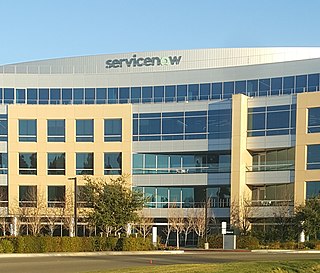
Nvidia Corporation is an American multinational corporation and technology company headquartered in Santa Clara, California, and incorporated in Delaware. It is a software and fabless company which designs and supplies graphics processing units (GPUs), application programming interfaces (APIs) for data science and high-performance computing as well as system on a chip units (SoCs) for the mobile computing and automotive market. Nvidia is also a dominant supplier of artificial intelligence (AI) hardware and software.

SAS is a statistical software suite developed by SAS Institute for data management, advanced analytics, multivariate analysis, business intelligence, criminal investigation, and predictive analytics. SAS' analytical software is built upon artificial intelligence and utilizes machine learning, deep learning and generative AI to manage and model data. The software is widely used in industries such as finance, insurance, health care and education.

Turnitin is an Internet-based similarity detection service run by the American company Turnitin, LLC, a subsidiary of Advance Publications.
Artificial intelligence (AI) has been used in applications throughout industry and academia. Similar to electricity or computers, AI serves as a general-purpose technology that has numerous applications. Its applications span language translation, image recognition, decision-making, credit scoring, e-commerce and various other domains. AI which accommodates such technologies as machines being equipped perceive, understand, act and learning a scientific discipline.
Music and artificial intelligence is the development of music software programs which use AI to generate music. As with applications in other fields, AI in music also simulates mental tasks. A prominent feature is the capability of an AI algorithm to learn based on past data, such as in computer accompaniment technology, wherein the AI is capable of listening to a human performer and performing accompaniment. Artificial intelligence also drives interactive composition technology, wherein a computer composes music in response to a live performance. There are other AI applications in music that cover not only music composition, production, and performance but also how music is marketed and consumed. Several music player programs have also been developed to use voice recognition and natural language processing technology for music voice control. Current research includes the application of AI in music composition, performance, theory and digital sound processing.

ServiceNow, Inc. is an American software company based in Santa Clara, California, that develops a cloud computing platform to help companies manage digital workflows for enterprise operations. Founded in 2003 by Fred Luddy, ServiceNow is listed on the New York Stock Exchange and is a constituent of the Russell 1000 Index and S&P 500 Index. In 2018, Forbes magazine named it number one on its list of the world's most innovative companies.
Grammarly is a Ukraine-founded cloud-based typing assistant, headquartered in San Francisco. It reviews spelling, grammar, punctuation, clarity, engagement, and delivery mistakes in English texts, detects plagiarism, and suggests replacements for the identified errors. It also allows users to customize their style, tone, and context-specific language.

Brainly is an education company based in Kraków, Poland, with headquarters in New York City. It is an AI-powered homework help platform targeting students and parents. As of November 2020, Brainly reported having 15 million daily active users, making it the world's most popular education app. In 2024, FlexOS reported Brainly as the #1 Generative AI Tool in the education category and the #6 Generative AI Tool overall. Also in 2024, Andreessen Horowitz reported Brainly as #6 in the Top 50 Gen AI Mobile Apps by monthly active users.

Databricks, Inc. is a global data, analytics and artificial intelligence company founded by the original creators of Apache Spark.

Dynatrace, Inc. is a global technology company that provides a software observability platform based on artificial intelligence (AI) and automation. Dynatrace technologies are used to monitor, analyze, and optimize application performance, software development and security practices, IT infrastructure, and user experience for businesses and government agencies throughout the world.

OpenAI is an American artificial intelligence (AI) research organization founded in December 2015, researching artificial intelligence with the goal of developing "safe and beneficial" artificial general intelligence, which it defines as "highly autonomous systems that outperform humans at most economically valuable work". As one of the leading organizations of the AI boom, it has developed several large language models, advanced image generation models, and previously, released open-source models. Its release of ChatGPT has been credited with starting the AI boom.

Artificial intelligence art is any visual artwork created through the use of artificial intelligence (AI) programs such as text-to-image models. AI art began to gain popularity in the mid- to late-20th century through the boom of artificial intelligence.
Deepfake pornography, or simply fake pornography, is a type of synthetic pornography that is created via altering already-existing pornographic material by applying deepfake technology to the faces of the actors. The use of deepfake porn has sparked controversy because it involves the making and sharing of realistic videos featuring non-consenting individuals, typically female celebrities, and is sometimes used for revenge porn. Efforts are being made to combat these ethical concerns through legislation and technology-based solutions.
Generative Pre-trained Transformer 3 (GPT-3) is a large language model released by OpenAI in 2020. Like its predecessor, GPT-2, it is a decoder-only transformer model of deep neural network, which supersedes recurrence and convolution-based architectures with a technique known as "attention". This attention mechanism allows the model to selectively focus on segments of input text it predicts to be most relevant. It uses a 2048-tokens-long context, float16 (16-bit) precision, and a hitherto-unprecedented 175 billion parameters, requiring 350GB of storage space as each parameter takes 2 bytes of space, and has demonstrated strong "zero-shot" and "few-shot" learning abilities on many tasks.
GitHub Copilot is a code completion tool developed by GitHub and OpenAI that assists users of Visual Studio Code, Visual Studio, Neovim, and JetBrains integrated development environments (IDEs) by autocompleting code. Currently available by subscription to individual developers and to businesses, the generative artificial intelligence software was first announced by GitHub on 29 June 2021, and works best for users coding in Python, JavaScript, TypeScript, Ruby, and Go. In March 2023 GitHub announced plans for "Copilot X", which will incorporate a chatbot based on GPT-4, as well as support for voice commands, into Copilot.
Hugging Face, Inc. is a French-American company based in New York City that develops computation tools for building applications using machine learning. It is most notable for its transformers library built for natural language processing applications and its platform that allows users to share machine learning models and datasets and showcase their work.

Yellow.ai, formerly Yellow Messenger, is a multinational company headquartered in San Mateo, California focused on customer service automation. It was founded in 2016 and provides an AI platform for automating customer support experiences across chat and voice. The platform supports more than 135 languages across more than 35 channels.

Generative artificial intelligence is artificial intelligence capable of generating text, images, videos, or other data using generative models, often in response to prompts. Generative AI models learn the patterns and structure of their input training data and then generate new data that has similar characteristics.
Tabnine is an artificial intelligence (AI) coding assistant developed by Tabnine, which was founded by Dror Weiss and Professor Eran Yahav in Tel Aviv, Israel, in 2013. Initially established under the name Codota, the company underwent a rebranding in May 2021 following the release of the company’s first large language model based AI coding assistant, adopting the name Tabnine.










